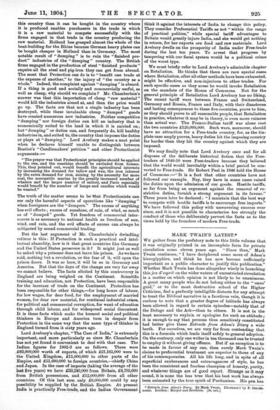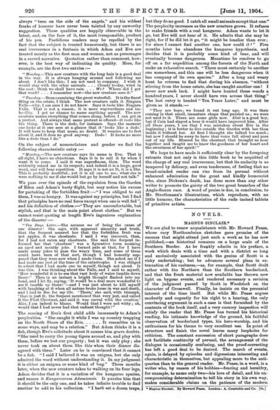WE gather from the prefatory note to this little volume
that it was originally printed in an incomplete form for private circulation some eleven years ago. "Since then," Mark Twain continues, "I have deciphered some more of Adam's hieroglyphics, and think he has now become sufficiently important as a public character to justify this publication." Whether Mark Twain has done altogether wisely in launching this jeu d'esprit on the wider waters of unrestricted circulation is a matter on which opinion is not likely to be unanimous. A great many people who do not belong either to the " unco" guid," or to the most destructive school of the Higher Criticism, feel a perfectly intelligible distaste for any attempt to treat the Biblical narrative in a facetious vein, though it is curious to note that a greater degree of latitude has always been allowed in regard to certain episodes—notably that of the Deluge and the Ark—than to others. It is not in the least necessary to explain or apologise for such an attitude ; it is enough to say that persons thus sensitively constituted had better give these Extracts from Adam's Diary a wide berth. For ourselves, we are very far from contending that this is a formula which lends itself safely to general adoption_ On the contrary, only one writer in ten thousand can be trusted to employ it without giving offence. But if an exception is to be made in favour of any one, then surely Mark Twain's claims to preferential treatment are superior to those of any of his contemporaries. All his life long, and in spite of all superficial exuberances and extravagances of style, he has been the consistent and fearless champion of honesty, purity, and whatever things are of good report. Strange as it may sound, it is none the less true that his best work has always been animated by the true spirit of Puritanism. His pen has • Extracts from Adam's Diary. By Mark Twain. Illustrate.' by F. Strotls- mann. London : Harper and Brothers. [2s. net.]
always "been on the side of the angels," and his wildest freaks of humour have never been tainted by any unworthy suggestion. These qualities are happily observable in the latest, and, on the face of it, the most irresponsible, product of his pen. Fastidious readers may be repelled by the fact that the subject is treated humorously, but there is no real irreverence in a fantasia in which Adam and Eve are treated merely as the first man and woman, not as personages in a sacred narrative. Quotation rather than comment, how- ever, is the best way of indicating its quality. Here, for example, are the first two entries :—
"Monday.—This new creature with the long hair is a good deal in the way. It is always hanging around and following me about. I don't like this ; I am not used to company. I wish it would stay with the other animals. . . . Cloudy to-day, wind in the east : think we shall have rain. . . . We? Where did I get that word ? . . . I remember now—the new creature uses it."
" Tuesday.—Beea examining the great waterfall. It is the finest thing on the estate, I think. The new creature calls it Niagara Falls—why, I am sure I do not know. Says it looks like Niagara Falls. That is not a reason; it is mere waywardness and im- becility. I get no chance to name anything myself. The new creature names everything that comes along, before I can get in a protest. And always that same pretext is offered—it looks like the thing. There is the dodo, for instance. Says the moment one looks at it one sees at a glance that it 'looks like a dodo.' It will have to keep that name, no doubt. It wearies me to fret about it, and it does no good anyway. Dodo ! It looks no more like a dodo than I do."
On the subject of nomenclature and gender we find the following characteristic entry :—
"Monday.—The new creature says its name is Eve. That is all right, I have no objections. Says it is to call it by when I want it to come. I said it was superfluous, then. The word evidently raised me in its respect; and indeed it is a large, good word, and will bear repetition. It says it is not an It, it is a She. This is probably doubtful ; yet it is all one to me ; what she is were nothing to me if she would but go by herself and not talk."
We pass over the episode of the expulsion from the Garden of Eden and Adam's hasty flight, but may notice his excuse for partaking of the forbidden fruit :—" I was obliged to eat them, I was so hungry. It was against my principles, but I find that principles have no real force except when one is well fed "; and his definition of clothes :—" They are uncomfortable, but stylish, and that is the main point about clothes." But we cannot resist quoting at length Eve's ingenious explanation of the disaster :— "Tea Days Later.—She amuses me of being the cause of our disaster ! She says, with apparent sincerity and truth, that the Serpent assured her that the forbidden fruit was not apples, it was chestnuts. I said I was innocent, then, for I had not eaten any chestnuts. She said the Serpent in- formed her that 'chestnut' was a figurative term meaning an aged and mouldy joke. I turned pale at that, for I have made many jokes to pass the weary time, and some of them could have been of that sort, though I had honestly sup- posed that they were new when I made them. She asked me if I had made one just at the time of the catastrophe. I was obliged to admit that I had made one to myself, though not aloud. It was this. I was thinking about the Falls, and I said to myself, 'How wonderful it is to see that vast body of water tumble down there!' Then in an instant a bright thought flashed into my head, and I let fly, saying, It would be a deal more wonderful to see it tumble up there V—and I was just about to kill myself with laughing at it when all nature broke loose in war and death, and I had to flee for my life. There,' she said, with triumph, that is just it; the Serpent mentioned that very jest, and called it the First Chestnut, and said it was coeval with the creation.' Alas, I am indeed to blame. Would that I were not witty ; oh, would that I had never had that radiant thought !"
The coming of Eve's first child adds immensely to Adam's perplexities. "She caught it while I was up country trapping on the North Shore of the Erie It resembles us in some ways, and may be a relation." But Adam thinks it is a fish, though Eve's solicitude about it causes him grave doubts. "She used to carry the young tigers around so, and play with them, before we lost our property ; but it was only play ; she never took on about them like this when their dinner dis- agreed with them." Later on he is convinced that it cannot be a fish. "I said I believed it was an enigma, but she only admired the word without understanding it. In my judgment it is either an enigma or some kind of bug." Three months later, when the new creature takes to walking on its four legs, Adam decides that it is a variation of the kangaroo species, and names it Kangaroorura Adamiensis. It puzzles him that
it should be the only one, and he takes infinite trouble to find another to add to his collection. "I havTi set a dozen traps,
The perplexity increases as the new creature grows. It refuses to make friends with a real kangaroo. Adam wants to let it go, but Eve will not hear of it. He admits that she may be right, for if he did let it go, "it might be lonelier than ever ; for since I cannot find another one, how could it ?" Five months later he abandons the kangaroo hypothesis, and decides that it is probably some kind of bear, and will eventually become dangerous. Meantime he resolves to go off on a far expedition among the forests of the North and make an exhaustive search. "There must certainly be another one somewhere, and this one will be less dangerous when it has company of its own species." After a long and weary hunt he returns to find that during his absence, "without stirring from the home estate, she has caught another one ! I never saw such luck. I might have hunted these woods a
hundred years, I never should have run across that thing." The last entry is headed "Ten Years Later," and must be given as it stands :— " They are boys ; we found it out long ago. It was their coming in that small, immature shape that puzzled us ; we were not used to it. There are some girls now. Abel is a good boy, but if Cain had stayed a bear it would have improved him. After all these years, I see that I was mistaken about Eve in the beginning ; it is better to live outside the Garden with her than inside it without her. At first I thought she talked too much ; but now I should be sorry to have that voice fall silent and pass out of my life. Blessed be the chestnut that brought us near together and taught me to know the goodness of her heart and the sweetness of her spirit !"
We hope to have made it sufficiently clear by the foregoing extracts that not only is this little book to be acquitted of the charge of any real irreverence, but that its audacity is so tempered by delicacy, and even tenderness, of feeling that no broad-minded reader can rise from its perusal without enhanced admiration for the great and kindly humourist who, since Dickens's death, has done more than any other writer to promote the gaiety of the two great branches of the Anglo-Saxon race. A word of praise is due, in conclusion, to Mr. Strothmann's illustrations, which reproduce, with no little humour, the characteristics of the rude incised tablets of primitive artists.
NO











































 Previous page
Previous page